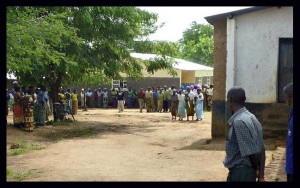Another pupil had died from the meningitis outbreak. I watched Mr Shawa, the school caretaker, cleaning the white, pine boards and placing them carefully against the library building. He was making another coffin, the fourth in as many weeks. His task was carried out with quiet patience, respect and dignity; this one was for Mutsima, a third year pupil who had passed away in the night.
Our house was the nearest to the dormitory block where my car was always available to transport the sick to the small hospital in the town. I had driven Mutsima there two days earlier. Our chief concern, not unnaturally , was for our eight month old child, Caoimhe , who a couple of months previously had suffered a serious bout of malaria, a killer of many young, African children. That said, my wife, Liz, a woman of quite remarkable fortitude and commitment, worked non-stop with other staff to do what she could for our pupils.
As three o’clock approached in Tullibody, there was the usual offer of volunteers to collect my son from the nursery which was in another part of the building. Isobel had only just set off when the fire alarm sounded. I suspected a false alarm because the headteacher would not normally have initiated a fire drill at that hour. The pupils were ushered to the assembly point in the playground and, as I started to take the register, we became aware of the black smoke billowing over the building. The whereabouts of Neill, my son, and his helper became an immediate concern but almost immediately he was there by my side. Isobel had obeyed fire drill training to the letter, leaving with Neill by the nearest exit and making their way to the class assembly point. Within an hour, four classrooms had been burned down and a roof collapsed. The teachers in that learning area had performed with consummate professionalism and guided all of their pupils to safety. Parents conveyed their sincere thanks. No authority official bothered to visit the school afterwards and teachers were compelled to claim for personal property such as bags and coats on their own insurance cover.
The death of a young girl in an Edinburgh secondary school yesterday stirs these and other memories of death and suffering among the young when it is least expected. There will be a prolonged inquiry into the accident and, where appropriate, blame apportioned accordingly but it will then be largely forgotten until the next time.
The family of the dead, however, will grieve every single day for the rest of their lives.
Go ndeanfidh Dia trócaire ar a h-anam dílis

Moving, John, very moving. During my years teaching high school, that was a regular fear of mine – that I’d be faced with a seriously-ill youngster and do the wrong thing. Thanks be to God I was never tested. You and your wife clearly were and emerged with flying colours. Maith sibh.
Thanks, Jude
We were only part of a magnificent team in Zambia.In the teeth of a virulent and highly infectious disease, helplessness was frequently the prevailing feeling.
There were other events that impinged on us; Dunblane is only twenty mins from here and at one time I toyed with applying for the vacant HT post, a couple of years before the massacre. At the time we were supporting two undergraduates and it offered little more money. On exactly those grounds, I ruled it out as a job has to offer more than cash. Two St Brecan’s pupils died on Bloody Sunday and you may recall that Billy Brown died in St Columb’s one morning. I think it was in Coulter’s class. He was about a year older than us.